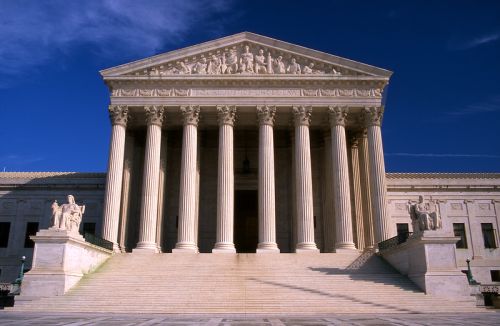 |
I have once again commissioned the services of my Contributing Editor, Rik Sault, to write about all the smart things that are far beyond my comprehension. I deliberately surround myself with very intelligent people so that I can abuse them at a later date to write articles for The Dishmaster, and so far my plan is working. Read below for a very succinct summary of a very insane issue.
Written By: Rik Sault, Contributing Editor
On Monday, a divided U.S. Supreme Court ruled that jailers may Constitutionally strip-search people arrested for the most minor offenses – like failing to use a turn signal or riding a bicycle without an audible bell – even if there is no reason to suspect that the arrestee is carrying concealed contraband.
The case was brought by a New Jersey man arrested after a traffic stop; the police mistakenly believed that he had failed to pay a fine. While he was jailed for a week, in two different facilities, he was twice required to shower with delousing soap and undergo a strip search. He brought suit alleging violations of his privacy rights under the Fourth and 14th Amendment, and arguing that jail officials must have reasonable suspicion of concealed contraband before they can strip-search people arrested for minor crimes.
At the Supreme Court, the justices split 5-4 along ideological lines. Justice Kennedy, the famed “swing” vote, wrote the opinion. He and the Court’s conservative faction found that it’s difficult for jails (strictly speaking, the term does not include prisons) to know which of the 13 million arrestees taken in each year are dangerous. Therefore, “courts must defer to the judgment” of the jailers “unless there is substantial evidence showing their policies are an unnecessary or unjustified response to problems of jail security.” Kennedy offered three reasons for rejecting a rule requiring reasonable suspicion before conducting a strip search: (1) deterring contraband, (2) the danger of introducing lice or contagions into the jails, and (3) the “identification and isolation” of gang members by looking for gang-related tattoos and markings.
Justice Breyer wrote the dissent, which was joined by Justices Ginsburg, Sotomayor, and Kagan. The four liberal justices found that the searches permitted by the majority were “a serious affront to human dignity and to individual privacy,” and that the Fourth Amendment should be understood to bar strip searches for minor offenses which do not involve drugs or violence unless there is a reasonable suspicion of concealed contraband.
But in spite of the dissenters’ qualms, the majority’s opinion appears to be fairly limited. In a concurring opinion, conservative Justice Alito explained, “The Court holds that jail administrators may require all arrestees who are committed to the general population of a jail to undergo visual strip searches not involving physical contact by (guards)… the Court does not hold that it is always reasonable to conduct a full strip search of an arrestee whose detention has not been reviewed by a judicial officer and who could be held in available facilities apart from the general population.” Because the decision applies only when the arrestee will be admitted to a jail’s general population, it is unlikely that the decision will directly affect lawsuits in which arrestees allege that they were unlawfully strip searched but not placed in a general population. Moreover, the strip searches upheld by the decision involve only a visual inspection – no touching. And the decision certainly does not require that all jails conduct the strip searches. It merely holds that the Fourth Amendment does not forbid them. Jails are free to set their own policies on whether to conduct visual-inspection strip searches of all arrestees.
The High Court’s decision can be viewed here
